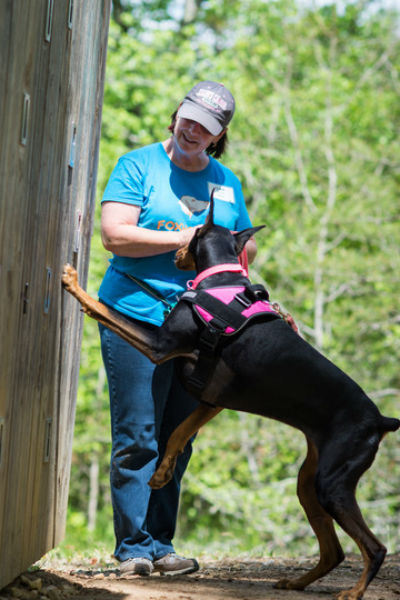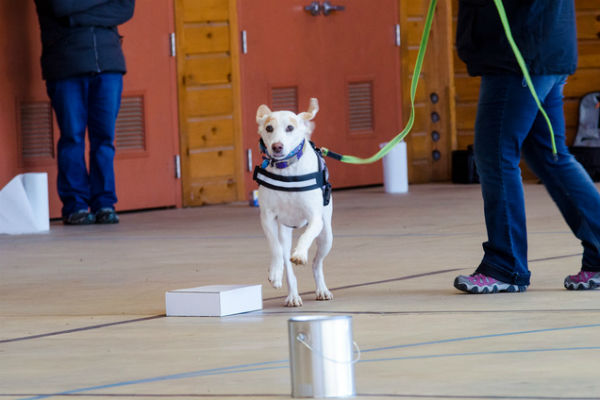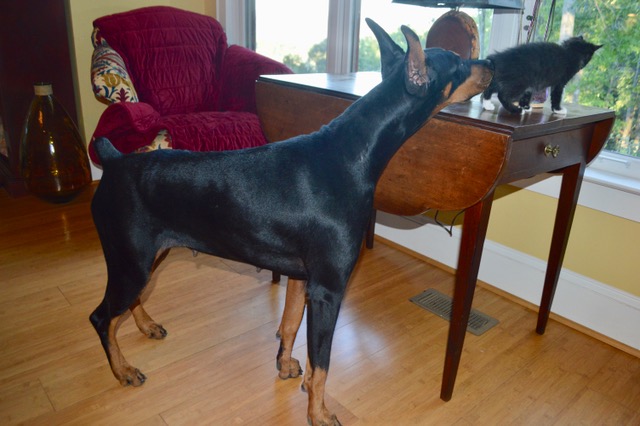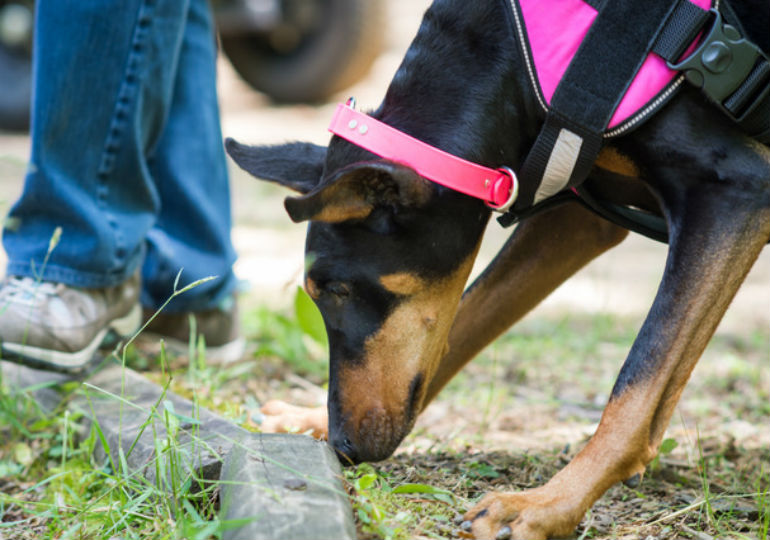Lisa Mallory’s Doberman, Kelly, does an exterior search for birch and anise oil.
We’ve all heard about the incredible power of a dog’s nose. Search and rescue dogs locate victims trapped under feet of rubble; K-9s track down fleeing suspects; and detection dogs alert to the presence of explosives, drugs, or other materials. But did you know that there are other uses for a dog’s nose?
Take the Lagotto Romagnolo, for example. This breed is a specialized truffle hunter. The Lagotto is bred and trained to hunt down truffles in the forest and alert their owners of their location. Pretty crazy, right? Yet it makes sense. A dog’s sense of smell is between 10,000 and 100,000 times more accurate than a human’s. Which is probably why dogs are always trying to smell everything! Luckily for them, the new sport, AKC Scent Work, allows them to do just that. And there’s a lot more to this sport than you initially might think.
Three professional handlers of detection dogs created scent work, but it’s a sport that welcomes everyone. According to Lisa Mallory, a fully licensed AKC Scent Work judge and professional dog trainer, who has five dogs that participate in the sport, scent work is actually great for non-professionals.
“A non-professional has the opportunity to do something with his or her dog that truly bonds them,” she explains to AKC.org. “Scent work is for the dogs’ enjoyment and is good for being able to see them work like a professional dog would — and being a part of that team is amazing.”

Kelly conducts an exterior search with a hide of a clove that is elevated to about four feet.
First introduced to scent work seven years ago, it didn’t take long for Mallory and her dogs to get hooked. “From the beginning, I was attracted to it because of the possibilities it held for my dogs, but as I began to understand more and more about how canines use their noses, and how odor travels and how different environmental conditions affect that, I became a scent work junkie,” she jokes.
She initially was curious to see if her dogs’ noses would be as good as breeds typically associated with scent work — such as Labrador Retrievers and German Shepherd Dogs — but quickly realized this sport offers equal opportunities to all kinds of dogs, including those who are not purebred.
“I have three Doberman Pinschers of various ages, a foxhound mix, and another mixed breed. Each of them love scent work,” she says. The benefits that the sport has provided to her dogs have been incredible. Her mixed breed dog, for example, once fearful and mistrusting, has grown into a confident dog in the sport. “She truly enjoys her time doing scent work, and it has given her a tremendous amount of confidence that has bled over to all areas of her life. She used to be afraid of objects moving. Now she plows into boxes and areas where there is a target odor with blind abandon and joy.”

Duchess, Mallory’s foxhound mix, practices her container searches.
Scent work is a great way to engage physically with your dog, and it also stimulates them mentally. “When dogs use their sense of smell, it is tiring for them,” Mallory explains. “They are using a large portion of their brain to do the work. After some scenting activity, most dogs are able to relax more, and many take nice, long naps.”
Also, as Mallory points out, through scent work you can train your dog to do some pretty cool and unconventional things. Living in a rural area of the Appalachian Mountains in North Carolina, Mallory and her family use their dogs’ scent work abilities to protect their domestic cats from coyotes and bobcats, for example.
“We have four cats that are free to go outside during the day, but around 5 p.m. we gather them to come inside for the night,” she says. “Once in a while, one of our cats decides he wants to stay out longer — just like a kid who doesn’t want to stop playing and come in for bedtime. So with a cue of ‘Where’s Rocky?’ (or the name of one of the other cats), Aero, our male Doberman, will confidently trot outside and lift his head to sample the air. He then heads in the direction of the cat and can pinpoint the exact location, so we can bring the offender inside!”

Mallory’s dog, Gigi, practices her kitty-finding skills inside.
AKC Scent Work will premiere at the first-ever Eukanuba Performance Games, and AKC Clubs will start holding scent work events on Oct. 1, 2017. If you want to learn more about getting started with your dog, find an AKC Scent Work trial in your area on our Events Calendar, and contact a local AKC club or training facility about scent work classes.


